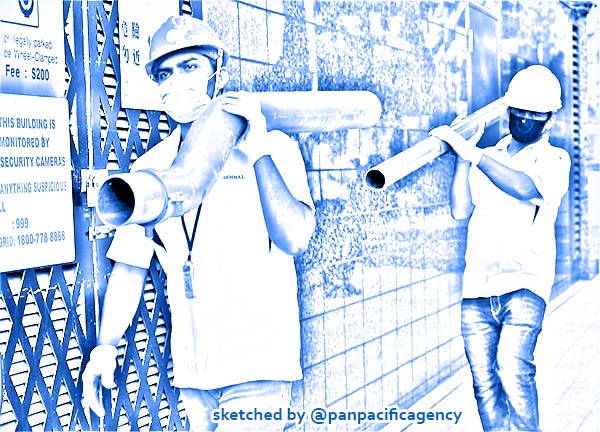Guests from higher-risk places can enter Singapore from Aug 10 if fully vaccinated

Construction workers wearing masks in precaution of the coronavirus outbreak carry pipes as they pass a building in the Central Business District in Singapore on February 18, 2020. Photo: Today. Sketched by the Pan Pacific Agency.
SINGAPORE, Aug 7, 2021, ST. Work pass holders and their dependants will be allowed to enter Singapore from higher-risk countries or regions from next Tuesday (Aug 10), provided they are fully vaccinated before arrival, The Straits Times reported.
The Ministry of Manpower (MOM) on Friday (Aug 6) announced it will resume issuing entry approvals for this group in a safe and calibrated manner.
Higher-risk places currently include all countries and regions other than New Zealand, Brunei, mainland China, Hong Kong, Macau and Taiwan.
A traveller will be considered fully vaccinated two weeks after receiving the full dosage of any Covid-19 vaccine under the World Health Organisation’s Emergency Use Listing.
These include the Pfizer-BioNTech/Comirnaty and Moderna mRNA vaccines as well as the vaccines made by Sinovac, Sinopharm, AstraZeneca, Johnson & Johnson and the Serum Institute of India’s Covishield vaccine.
The work pass holders and their dependants who are approved for entry will need to show documentary proof of their full vaccination status to the airlines before boarding and at the checkpoint upon arrival in Singapore.
Those who are unable to produce the necessary documentation will be denied boarding and entry.
All pass holders and their dependants will also be subject to the prevailing health protocols in Singapore, said the MOM.
Individuals who have received their vaccinations overseas must update their vaccination records in the National Immunisation Registry (NIR) within two weeks of completing their stay-home notice (SHN) in Singapore.
They will need to show documentary proof of their overseas vaccination and a positive serology test result taken at one of the Ministry of Health’s designated private healthcare providers.
Serology tests check for the presence of antibodies, which indicate that the person has Covid-19 immunity from a past infection or vaccination.
Those who fail to produce valid vaccination documents or take the required serology test may have their work pass privileges suspended or revoked, the MOM said.
Migrant domestic workers as well as S Pass and work permit holders in the construction, marine shipyard and process (CMP) sectors are exempted from the vaccination requirement.
“There are ongoing industry initiatives in these sectors with tightened end-to-end safe management processes to bring these workers into Singapore safely and minimise the risk of Covid-19 importation,” said the MOM.
Those who opt for Sinovac and jabs under WHO emergency use listing to be considered fully vaccinated
However, the ministry added it will only begin accepting new entry applications for these pass holders from higher-risk places at a later date.
This is because rescheduling efforts are still under way for those whose entry applications were approved earlier this year, but who could not enter Singapore due to tighter restrictions in place since May.
Dependants under the age of 12 are also exempted from the vaccination requirement.
Those aged 12 to 17 can enter Singapore without proof of vaccination on the condition that they take their first shot of a vaccine used in Singapore’s national vaccine programme within a month of arrival, and the second shot within a month of the first.
Currently, only the Pfizer-BioNTech/Comirnaty and Moderna vaccines are approved under the Pandemic Special Access Route (PSAR) for use in the national programme.
Work pass holders and dependants who are medically ineligible for vaccination should obtain a doctor’s memo and appeal to be exempted from the requirement before applying for entry approval, the MOM said.
“With the steady increase in local and international vaccination rates, Singapore can gradually reopen its borders and allow more workers to enter while minimising the public health risk to the community, and we will review our entry requirements accordingly,” said the ministry.
“While we cannot prevent imported infections completely, high vaccination rates coupled with public health defences will help guard against major outbreaks.”